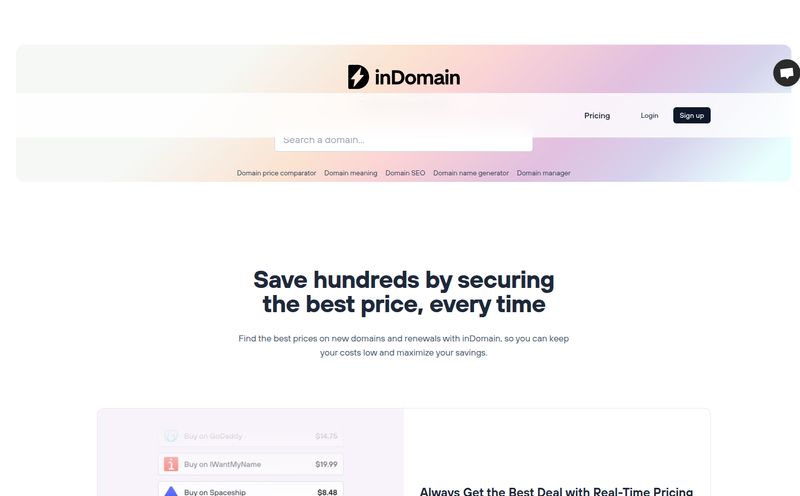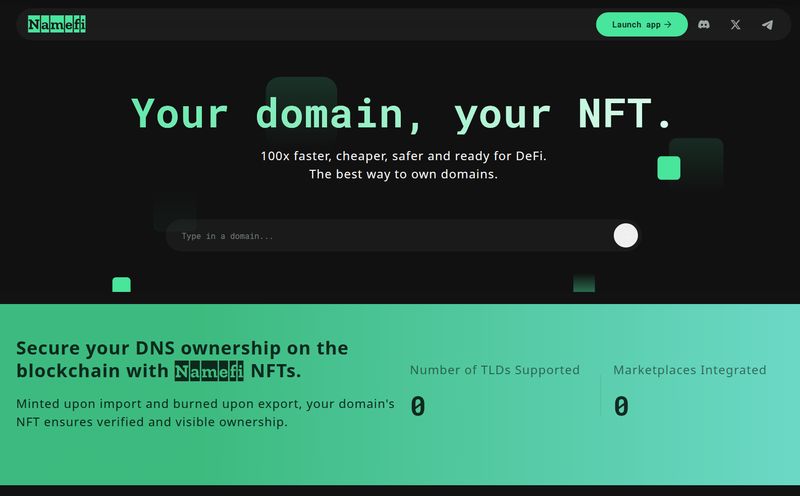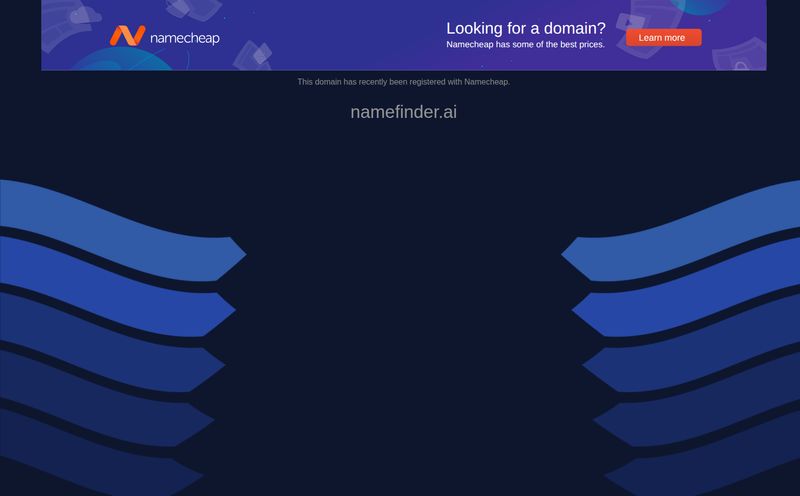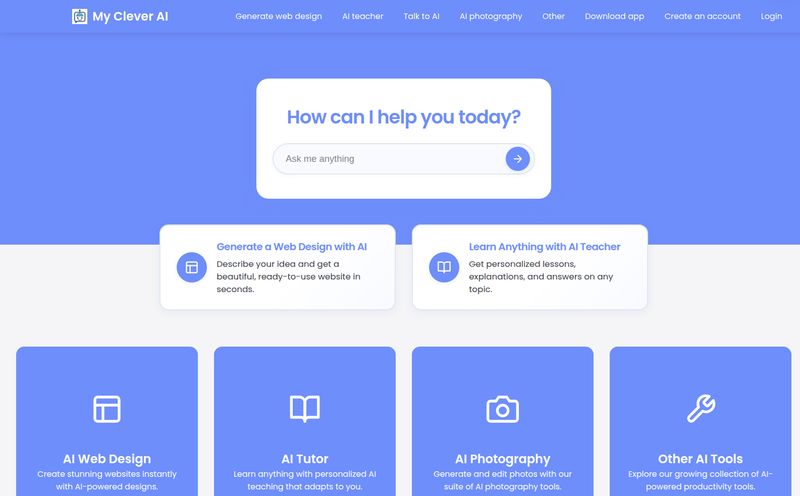If you're an indie hacker, a solo founder, or just someone with a notebook full of million-dollar ideas, you know the fear. It's that cold, creeping dread that you'll spend the next six months of your life—every evening, every weekend—building something that absolutely no one will ever use. Or worse, pay for. I've been there. My project graveyard is filled with beautifully coded tombstones for ideas that had zero market-fit.
We've all heard the advice: "Validate your idea first!" It's screamed from the rooftops of every startup accelerator and whispered in every founder community. But validation is hard. It means surveys, user interviews, and endless hours of competitive analysis. It's a grind. So when a tool pops up promising to turn your ideas into validated opportunities in mere minutes, my cynical, battle-hardened founder brain immediately sits up and pays attention. That tool is PGPH.
I stumbled upon it recently and its promise is bold, to say the least. Is it just another AI-wrapper, or is there something more to it? Let's take a look.
So, What is PGPH, Really?
At its core, PGPH is an AI-powered idea validation engine built specifically for people like us: indie hackers. The homepage says it all: "Skip the guesswork. Get instant market feedback, competition analysis, and growth potential." You basically type in a description of your SaaS idea—let's say, "A Chrome extension that mutes specific words on Twitter for mental health"—and it crunches the numbers and data to tell you if you're onto something, or if you should go back to the drawing board.
It’s designed to be the fastest way to validate an idea, because as the site says, "resources are tight, and every hour counts." Amen to that.
Why Idea Validation is the Hill to Die On
Before we get into the nitty-gritty of the tool, let's just sit with why this matters so much. The "build it and they will come" philosophy is a graveyard. The true path, especially for bootstrappers who don't have a pile of VC cash to burn, is to find a real, painful problem first. You're not just building a product; you're selling a painkiller.
Traditional validation is a slog. You have to become a part-time detective, digging through Reddit threads, conducting awkward interviews, and trying to gauge market size with shoddy, back-of-the-napkin math. It's the un-fun part of creation that we all wish we could skip. A tool that automates even 80% of that initial legwork isn't just a time-saver; it’s a burnout-preventer. It could be the difference between shipping a winner and abandoning your fifth project in a row.
A Look Under the Hood: The PGPH Process
The beauty of PGPH appears to be its simplicity. There isn't a 20-step onboarding process or a complicated dashboard. It's a single text box and a button. But behind that button, it claims to be doing some heavy lifting across a few key areas.
From Months of Research to a Few Minutes of Waiting
This is the primary sales pitch. The idea that you can condense what normally takes weeks or even months of research into a coffee break is... well, it's incredibly appealing. No more building a full MVP just to see if anyone cares. You get that initial gut-check instantly.
Real Market Data, Zero Fluff
PGPH claims to pull in real market data. This is the secret sauce. It's supposedly looking at things like market sizing, current trends, and existing workflow gaps. This moves beyond a simple Google search for competitors. It’s about understanding the environment your potential product would be born into. Is the market growing or shrinking? Are people actively complaining about the problem you want to solve? These are the signals that matter.
A Tool to Ship Winners, Not Duds
Ultimately, it’s all about increasing your odds of success. The site positions itself as a way to join the "top 1% of founders who validate first, build second." This leads to a higher success rate and, maybe more importantly, less burnout. It reframes validation not as a chore, but as a strategic first move.
What Real Indie Hackers are Saying
Of course, I could talk about its potential all day, but what do actual users think? The site features some pretty compelling testimonials that seem to be pulled from Reddit, which adds a layer of authenticity.
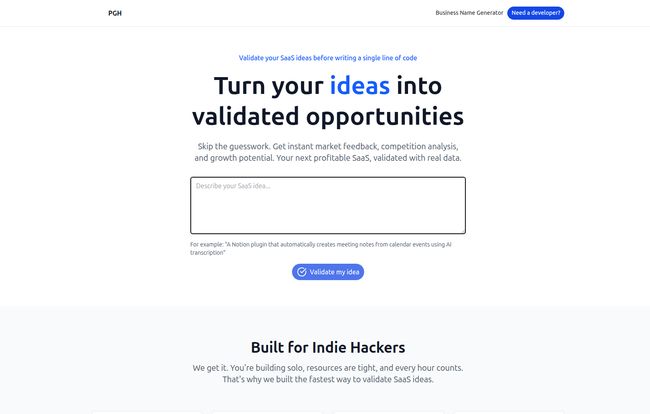
Visit SaaS Name Generator
One user, /u/www.justindev.fr, said,
Literally my 5 months of market and user research was shown to me in a few minutes without all my personal knowledge so I'd say a good job haha, good job with this amazing product!!
That’s a huge claim. Condensing five months of work into minutes is the kind of efficiency gain that changes the game.
Another user, /u/haker.life, typed in their old, successful business and was impressed:
I typed in my old business and the responses were exactly what I did which generated sales and success. I love the growth/marketing ideas based on where your users would be on tiktok or youtube/linkedin.
This is perhaps the most interesting piece of feedback. It suggests the tool not only validates the market but also provides actionable marketing strategies. That's a massive bonus.
The Million-Dollar Question: What About the Price?
So, what does this magic validation box cost? Well, that's where things get interesting. I went looking for a pricing page, as any good reviewer would, and was met with a classic... 404 Page not found. Yup.
Now, this could mean a few things. It might be that the tool is currently free while it's in beta, gathering feedback. It could be that they're using a credit-based system and you get some free validations upon signup (though the FAQ suggests a signup isn't even required). Or maybe the pricing page is just temporarily down. Whatever the reason, as of right now, it seems you can give it a spin without pulling out your credit card. For an indie hacker, "free" is a pretty compelling price point.
The Good, The Potential, and The AI-Generated
No tool is perfect, so let's try to put on our critical hats. The upside is obvious: speed, simplicity, and a laser-focus on the indie hacker's biggest pain point. It's a direct shot at the analysis paralysis that kills so many great ideas before they even start.
The potential downside? Well, it's an AI. And AI can be a bit of a black box. How accurate is the data, really? Where is it being pulled from? Is it just a very sophisticated scraper and summarizer, or does it have access to proprietary data sets? A validation report is only as good as the data feeding it. Relying on it completely without doing any of your own follow-up research would probably be a mistake. I see it more as a powerful compass to point you in the right direction, not a detailed, turn-by-turn map to your destination.
Is PGPH Right For You?
So who should be sprinting to their browser to try this out? Honestly, if you identify as a solo founder, bootstrapper, or indie hacker, this tool was literally built for you. It's also fantastic for product managers in smaller teams who need a quick way to vet feature ideas or new product directions without commissioning an expensive, slow market research report.
Who is it not for? Probably large enterprises that need incredibly deep, human-led research with extensive documentation and sourcing. This is a tool for rapid, directional validation, not a 100-page market analysis from Gartner.
Frequently Asked Questions About PGPH
Here are some answers to questions you might have, based on the site's own FAQ and a bit of my own interpretation.
How accurate is the validation?
My take: Think of it as highly educated guidance. The testimonial from the user who tested their old, successful business is a good sign. But you should always treat AI-generated analysis as a starting point. It will likely give you a strong directional signal and uncover competitors you missed, but you'll still want to talk to potential users.
Do I need to sign up?
It doesn't seem like it, at least not for an initial test. The homepage UI goes straight to the idea box, which is a fantastic, frictionless approach.
Who is this for?
It’s for the builders and the dreamers with limited time and cash. Indie hackers, solo founders, and small, agile teams will get the most out of this.
What if my idea already exists?
That's actually a good thing! It means a market exists. PGPH will likely identify those competitors for you, and its analysis can help you figure out how to find a unique angle or serve an underserved niche within that market.
Is my amazing, secret idea safe?
This is a valid question for any online tool. While there's no explicit privacy policy visible without digging, a reputable tool in this space would typically not store or share your ideas. Still, as a rule of thumb, maybe don't paste in the secret formula for Coca-Cola. Use it for vetting concepts.
Final Thoughts: A Compass for the Idea Maze
I have to say, I'm optimistic about PGPH. It tackles a genuine, painful problem in the startup world with a modern, AI-powered solution. It demystifies the black art of market validation and makes it accessible to everyone, not just those with a business degree or a research budget.
Is it a crystal ball that will guarantee your SaaS becomes a unicorn? Of course not. But building a startup is like navigating a maze in the dark. A tool like PGPH feels like someone just handed you a powerful flashlight and a compass. You still have to walk the path yourself, but you're a heck of a lot less likely to walk straight into a wall.
Given that it's apparently free to try, there’s really no reason not to take your latest shower-thought-idea and put it to the test. The worst-case scenario? You save yourself a few months of wasted effort. And that's a win in my book.
Reference and Sources
- PGPH Official Website: https://pgph.co/ (Note: URL is assumed based on the tool's name)
- User Testimonial Source: Reddit User /u/www.justindev.fr
- User Testimonial Source: Reddit User /u/thethmnz
- User Testimonial Source: Reddit User /u/joanarchitecture
- User Testimonial Source: Reddit User /u/haker.life
